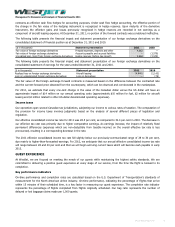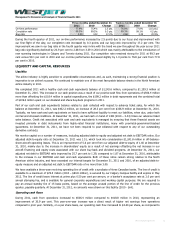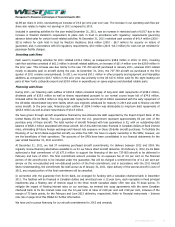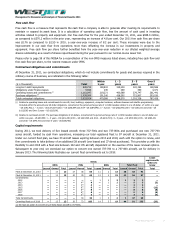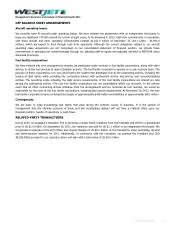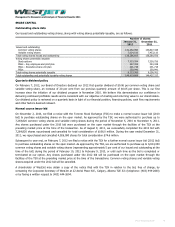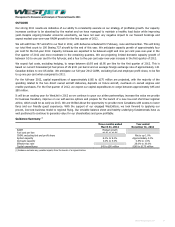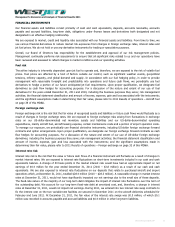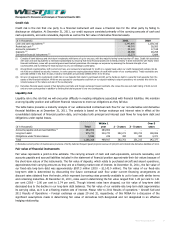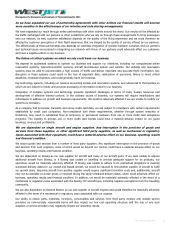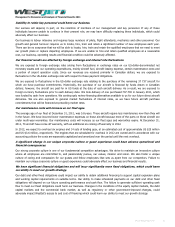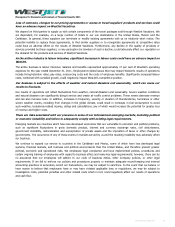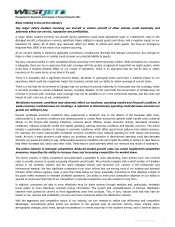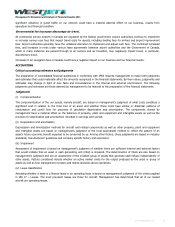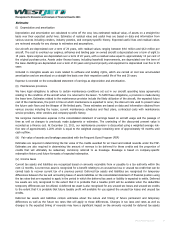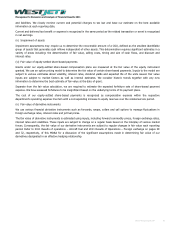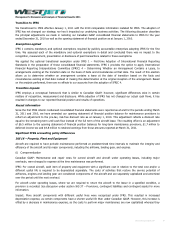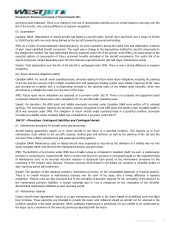Westjet 2011 Annual Report Download - page 43
Download and view the complete annual report
Please find page 43 of the 2011 Westjet annual report below. You can navigate through the pages in the report by either clicking on the pages listed below, or by using the keyword search tool below to find specific information within the annual report.
Management’s Discussion and Analysis of Financial Results 2011
│
As we have expanded our use of partnership agreements with other airlines our financial results will become
more sensitive to the effectiveness of our interline and code sharing arrangements.
We have expanded our reach through airline partnerships with other airlines around the world. Our results will be affected by
the traffic exchanged with our partners in other jurisdictions who we rely on through these arrangements to bring passengers
onto our network. As well, customer satisfaction depends on the quality of the flying experience and we could therefore be
affected by customer perceptions of their flight experience that are shaped by the quality of service offered by our partners.
The effectiveness of these partnerships also depends on seamless integration of systems between ourselves and our partners
and technical issues encountered in integrating our network with those of our partners could adversely affect our customers
and have a negative effect on our business.
The failure of critical systems on which we rely could harm our business.
We depend on automated systems to operate our business and support our initiatives, including our computerized airline
reservation systems, telecommunication systems, aircraft maintenance system and website. Our website and reservation
systems must be able to accommodate a high volume of traffic and deliver important and accurate flight information. Any
disruption in these systems could result in the loss of important data, reallocation of personnel, failure to meet critical
deadlines, increased expenses, and could generally harm our business.
Key technology systems, including our revenue accounting system and reservation systems, are outsourced to third parties on
whom we are reliant for timely and accurate processing of information critical to our business.
Integration of complex systems and technology presents significant challenges in terms of costs, human resources and
development of effective internal controls. In the ordinary course of business, our systems will require modifications and
refinements to address our growth and business requirements. We could be adversely affected if we are unable to modify our
systems as necessary.
As a company that processes, transmits and stores credit card data, we are subject to compliance with certain requirements
established by credit card companies. Non-compliance with these requirements, whether through system breaches or
limitations, may result in substantial fines or temporary or permanent exclusion from one or more credit card acceptance
programs. The inability to process one or more credit card brands could have a material adverse impact on our guest
bookings, revenue and profitability.
We are dependent on single aircraft and engine suppliers. Any interruption in the provision of goods and
services from these suppliers, or other significant third party suppliers, as well as mechanical or regulatory
issues associated with their equipment, could have a material adverse effect on our business, operating results
and financial condition.
We secure goods and services from a number of third party suppliers. Any significant interruption in the provision of goods
and services from such suppliers, some of which would be beyond our control, could have a material adverse effect on our
business, operating results and financial condition.
We are dependent on Boeing as our sole supplier for aircraft and many of our aircraft parts. If we were unable to acquire
additional aircraft from Boeing, or if Boeing was unable or unwilling to provide adequate support for its products, our
operations would be materially adversely affected. If Boeing was unable to adhere to its contractual obligations in meeting
scheduled delivery dates for our owned and leased aircraft, we would be required to find another supplier of aircraft to fulfill
our growth plans. Acquiring aircraft from another supplier would require significant transition costs and, additionally, aircraft
may not be available at similar prices or received during the same scheduled delivery dates, which could adversely affect our
business, operating results and financial condition. In addition, we would be materially adversely affected in the event of a
mechanical or regulatory issue associated with the Boeing 737 aircraft type, including negative perceptions from the travelling
community.
We are also dependent on General Electric as our sole supplier of aircraft engines and would therefore be materially adversely
affected in the event of a mechanical or regulatory issue associated with our engines.
Our ability to obtain parts, materials, inventory, consumables and services from third party vendors and outside service
providers on commercially reasonable terms will also impact our low cost operating structure and the loss of any such
suppliers or service providers may negatively impact our operating results.
WestJet Annual Report 2011 43


